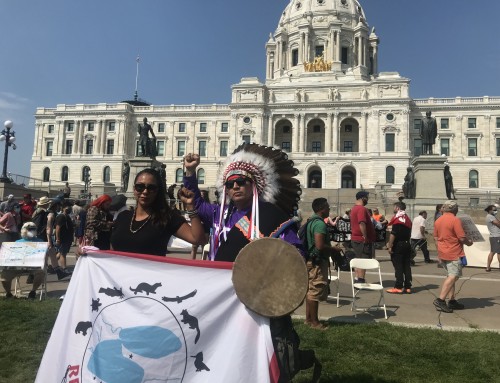All last week I felt a strong urge to go to the Philadelphia Flower Show—an extravagance I might have hesitated to write about after Jeanne’s post on middle class Quakers making others uncomfortable by talking about things they can’t afford, except that my being there and writing about it ended up feeling so right.
At first I wasn’t sure why I was there. It was a mob scene, not at all the peaceful taste of spring I was seeking. But then I passed two Quaker friends who were acting slightly furtive and realized that the Earth Quaker Action Team was planning civil disobedience in twenty minutes, just enough time for me to see the Bonsai exhibit and a few other favorites before coming back to support my friends. “Pray for us,” one requested, “and leave if they tell you to.”
It made sense that they were there. For seven months EQAT has been engaged in a non-violent campaign to pressure PNC to stop funding mountain-top removal, the devastating practice of blowing up mountains to get coal. PNC, which promotes itself as a green bank despite having been the biggest funder of mountain-top removal, has taken some steps in the right direction, but they haven’t stopped financing all the companies that engage in the practice, which is the first of EQAT’s challenges.
PNC is also one of the major sponsors of the Philadelphia Flower Show, which presented an irresistible opportunity for EQAT to set up a “crime scene” in front of a PNC display and sing, “Where Have All the Flowers Gone,” while the security people scrambled to figure out what to do with them. My favorite moment was when they brought some jazz musicians to play in front of the protest, but quickly realized that it was bringing more attention to the protesters, who pledged to stay until PNC Regional President J. William Mills came down to the Flower Show and took responsibility for his bank’s actions.
While those willing to be arrested if necessary stood in a line surrounded by security people in suits, those who came to support them chatted with the crowd about what was going on and why. I joined in and was pleased to see that most people who paused were supportive, or at least interested in learning about the issue. Only one woman said to me disapprovingly, “Some of us come to the Flower Show to have a good time!” which it later occurred to me was probably true of many white people who frequented the Woolworth lunch counters in the 1950s, only to be inconvenienced by students protesting segregation.
The interesting thing for me was to observe how good a time I had. I was suddenly grateful that three different friends turned down my invitation to the Flower Show because it meant I was free to stay and chat with some of the other Quakers I knew who had come as supporters. My years as a canvasser made me at ease giving strangers a two-sentence pitch, and knowing that I’d write about it afterwards confirmed my sense of purpose.
In the end, Mills didn’t show, and the police didn’t arrest anyone. Instead Convention Center Security escorted out nine EQAT members, who succeeded in getting some local news coverage and raising some awareness about the issue. For me, it was the most expensive protest I’ve ever attended, but also the most meaningful Flower Show.






Leave A Comment